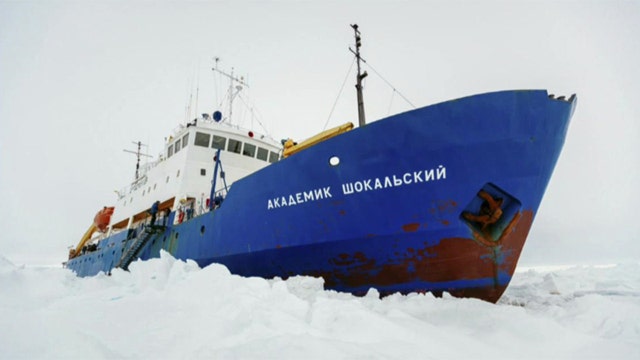Ice breaker racing to rescue trapped ship
Chinese ice breaking ship en route to save trapped research vessel
A Chinese icebreaker boat trying to eat through a dense ice block in Antarctica to rescue 74 people trapped on a ship since Christmas Day has had to halt efforts because the ice is too thick.
The Chinese “Snow Dragon” reached the ice floe off the coast of Cape de la Motte, and got about 6.7 nautical miles from the Russian-operated MV Akademik Shokalskiy Friday, before calling off the mission, according to the Australian Maritime Safety Authority.
The Russian ship is not in danger of sinking, and there are ample supplies and food for those aboard. A rescue coordination center is exploring other options to help free the ship, including the evacuation of all passengers. Another ice breaker ship that has better capabilities than the Chinese vessel, the Aurora Australis, is headed towards the Shokalskiy and is expected to arrive over the weekend.
The vessel got stuck after a blizzard's whipping winds pushed the sea ice around the ship, freezing it in place. The Snow Dragon had made steady, but slow progress but the packed ice was more solid than expected, as thick as 10-feet in some places.
Maritime authorities received the ship's distress signal Wednesday and sent the icebreakers to assist in the rescue. Expedition leader Chris Turney said he was hoping the Snow Dragon could break through the ice by Saturday.
There are 74 people aboard the vessel, some crew members and some passengers —half of them scientists, and half people who paid to assist in the experiments. "We're all just on tenterhooks at the moment, waiting to find out" how long it will take, Turney said by satellite phone. "Morale is really good."
The scientific team on board the vessel -- which left New Zealand on Nov. 28 -- had been recreating Australian explorer Douglas Mawson's century-old voyage to Antarctica when it became trapped. They plan to continue their expedition after they are freed, Turney said.
Passengers and crew have had to contend with blizzard conditions, including winds up to 40 miles per hour. "The blizzard we had yesterday was quite extraordinary -- it's not nice when you can feel the ship shaking," he said.
"We know that the ice conditions around us are extremely difficult and that the ice is under a lot of pressure," said Greg Mortimer, co-leader of the Australasian Antarctic Expedition (AAE), aboard the Shokalskiy. "The ships that are coming to assist us will probably not have the ability to cut a path into us individually, so they have to work in tandem," he told the Guardian.
Mortimer said the ice conditions around the Shokalskiy were extremely difficult. When the ship became trapped in ice earlier this week, it was only 2 miles from the open water. But now the ice block has expanded and the ship is more than 13 miles from the sea.
Alok Jha is a member of the Australasian Antarctic Expedition who has been blogging from the ship. A post he wrote on Thursday paints a clear picture of the extreme temperatures the passengers are enduring.
“Antarctica is not just cold, windy and wet. It is the extreme of all those things. Leave a hole in your armor – a glove not tucked into a sleeve, a gap around your neck where you forgot your scarf – and the weather will find and punish you fast. The cold starts off as stabbing, then it sears the skin and eventually sends the nerve-endings into a symphony of confusion. I took a glove off to type an email outside at one point and, after my fingers turned white and I lost the ability to move them, I swear they felt hot. Painful, boiling hot, as though I had just plunged them into a cup of coffee,” Jha wrote.
Although those stranded on the ship are safe, Jha suggests nature is always in control. “Right now the continent has us in its grasp and, though help is coming, the continent will decide when to let us go,” he wrote.
Despite the interruption to the expedition, the scientists have continued their research while stuck, counting birds in the area and drilling through the ice surrounding the ship to photograph sea life.
Click for more from the Guardian.
The Associated Press contributed to this report.









































